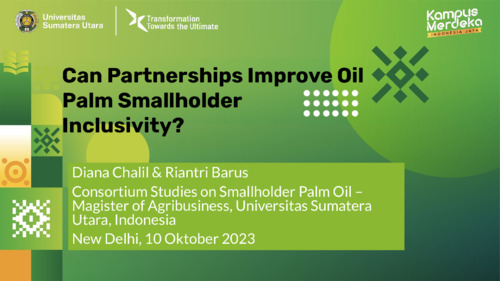Can partnerships improve the Indonesian oil palm smallholders’ inclusivity?
Abstract
Partnerships are widely applied to improve smallholder inclusivity in the value chain. The results are not always as expected. This study was conducted to analyze the factors influencing smallholder inclusivity. Oil palm smallholders were chosen, considering that palm oil is the largest agribusiness in Indonesia, and more than 40% of the total land area belongs to smallholders. The data were collected from 480 partnered and nonpartnered smallholders from four oil palm center provinces in Indonesia—namely North Sumatra, South Sumatra, Riau, and Jambi—and analyzed with a generalized linear model. Inclusivity 96 BOOK OF ABSTRACTS as the dependent variable was measured using four components: reward, ownership, voice, and risk. The five possible influencing factors—contract, technical knowledge/skill, technical supervision, partnership, and participation in smallholder groups—were included as the independent variables. The results show that out of all the factors, only contract and technical knowledge/skill significantly influenced smallholder inclusivity. This result explains that partnerships are not enough to improve smallholder inclusivity unless it is implemented effectively. Partnered samples have different levels of relationships. Partnerships with contracts are intensive and consistent; and have been maintained long enough to appear to provide better selling prices, group assets, means of communication, and risk management for smallholders. Based on the results, some recommendations are proposed to improve the partnerships of Indonesian oil palm smallholders.

